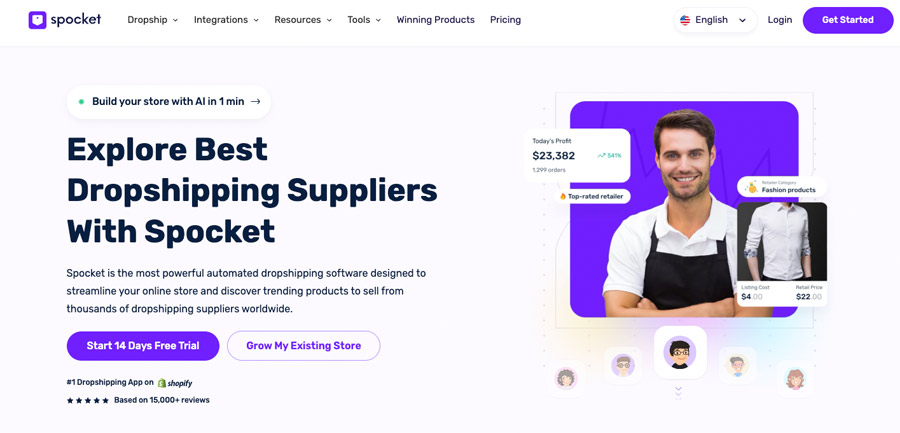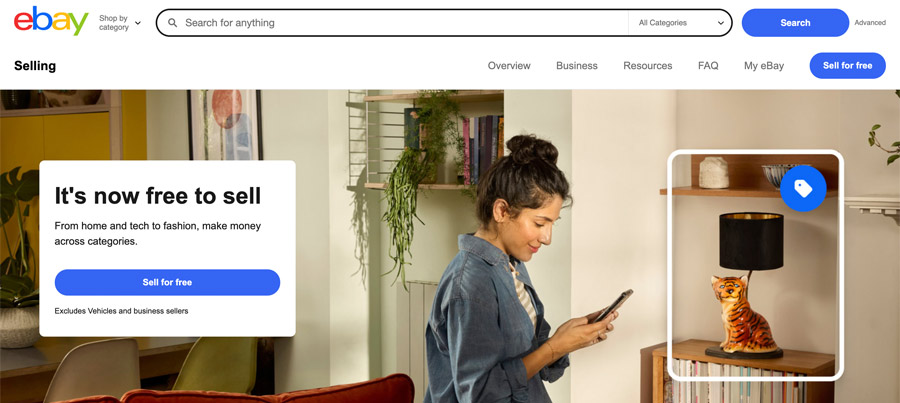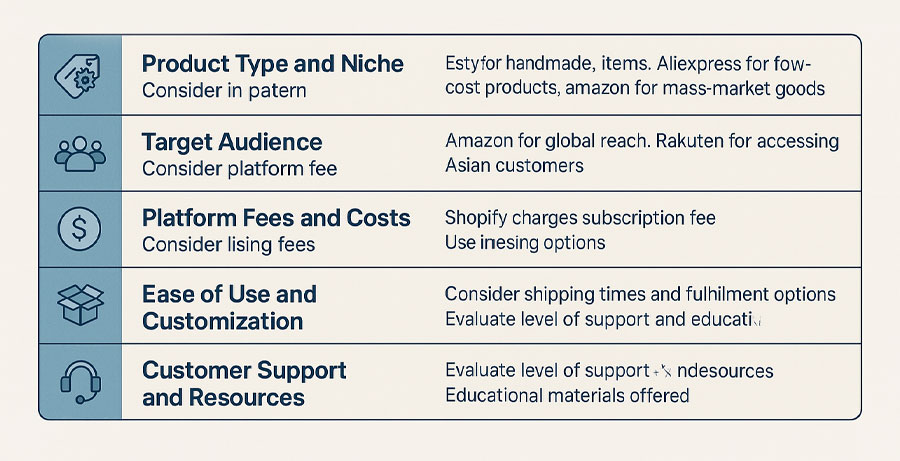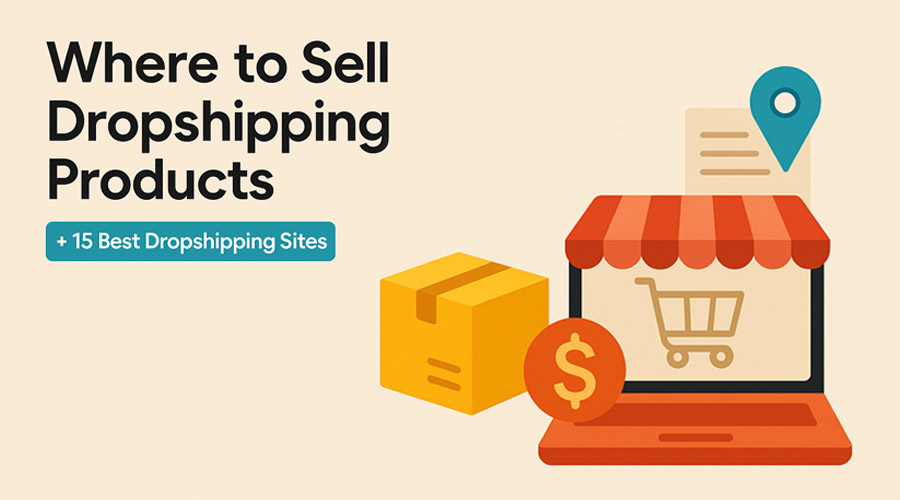Key Takeaways
- Select the optimal dropshipping platform to maximize sales potential and outperform competitors in your niche.
- Evaluate platforms methodically by comparing costs, target audiences, integration features, and shipping options.
- Build a strong brand connection by choosing a platform that aligns with your desired customer experience and control.
- Explore the wide array of dropshipping platforms available, from large marketplaces to customizable online stores.
While warehouse costs are high, dropshipping is one of the best ways to start a new business and make your dreams come true. But what is dropshipping?
In simple terms, dropshipping is when a business does not keep the products it sells in stock. Instead, the business buys the product after it has been sold, not beforehand. Choosing where to sell dropshipping products is crucial for success. Because depending on your product, you can boost sales by selecting the most suitable one. By increasing sales, you might generate more income and expand your business in no time.In this article, we will introduce where to sell dropship products and discuss the best strategies for each platform to maximize profit.
Where to Sell Dropship Products?
It’s a piece of cake, right? You select the products you need to sell, obtain them from sources and then sell to users who need them. But finding out “where” to take your dropshipping products can be a bit challenging. Here are some reliable websites to sell your products in, making your journey easier and more manageable.
1. Spocket

Spocket is a dropshipping platform that connects sellers with US and European suppliers. It offers high-quality products with fast shipping, making it a great option for businesses that want to avoid long delivery times.
Pros:
-
Fast shipping from US and EU suppliers
-
High-quality product selection
-
Easy integration with Shopify and WooCommerce
Cons:
-
Smaller product range than AliExpress
-
Monthly subscription fees
Cost:
-
Free plan available; paid plans start at $39.99/month
Target Audience:
-
Sellers prioritize fast shipping and high-quality products.
2. Amazon
Amazon is one of the largest online marketplaces, providing instant access to millions of buyers. With its massive customer base, it’s a great place to scale quickly, but competition and seller fees can be challenging. Use FBA for faster shipping and better customer trust while optimizing product listings with strong SEO.
Pros:
-
Huge customer base with high trust
-
FBA (Fulfillment by Amazon) for hands-off logistics
-
Fast and reliable shipping options
Cons:
-
High competition from other sellers
-
Strict policies and potential account suspensions
Cost:
-
$0.99 per item sold (individual plan) or $39.99/month (professional plan) plus referral fees
Target Audience:
-
Sellers looking for high-volume sales and fast scalability
3. Shopify

Shopify is one of the most popular e-commerce platforms for building an online store, starting with a $1 monthly subscription. The platform gives you complete control over branding, design, and pricing, allowing you to tailor your store to your business needs. As your business grows, you’ll want to explore ways to maximize your revenue. One effective strategy is to use a bundle app, which lets you create product bundles, such as “Frequently Bought Together,” encouraging customers to purchase multiple items at once. This approach can significantly increase your average order value and overall sales.
Pros:
-
Fully customizable store with many apps and integrations
-
No competition from other sellers on your site
-
Scalable for businesses of all sizes
Cons:
-
Requires marketing and paid ads to get traffic
-
Monthly fees add up as you grow.
Cost:
-
Plans start at $29/month, up to $299/month
Target Audience:
-
Entrepreneurs who want a branded online store
4. eBay

eBay is an excellent platform for testing where to sell dropship items before committing to a specific niche.
eBay is a global marketplace that allows sellers to list products in auctions or fixed-price formats. It’s great for testing different products but comes with high competition and seller fees.
Pros:
-
Large global customer base
-
Allows both auction and fixed-price listings
-
Easy to start selling
Cons:
-
High competition and price wars
-
Fees for listing and final sales
Cost:
-
The first 50 listings are free; then insertion fees and final value fees (around 10%)
Target Audience:
-
Sellers looking to test different products or pricing strategies.
5. Etsy
Etsy is known for handmade, vintage, and unique products. While it’s not traditionally a dropshipping platform, it’s great for niche sellers who offer customized or specialty items.
Pros:
-
Loyal customer base looking for unique products
-
Easy-to-use selling platform
-
Built-in marketplace traffic
Cons:
-
Limited to specific product categories
-
Listing and transaction fees can add up.
Cost:
-
$0.20 per listing plus a 5% transaction fee
Target Audience:
-
Sellers offering creative, custom, or niche products
6. BigCommerce
BigCommerce is a powerful e-commerce platform designed for businesses that want flexibility and scalability. It provides advanced tools for SEO, marketing, and product management, making it ideal for long-term growth.
Pros:
-
No transaction fees, unlike Shopify
-
Built-in SEO and marketing tools
-
Scalable for growing businesses
Cons:
-
Slightly complex setup compared to Shopify
-
Higher pricing for large businesses
Cost:
-
Starts at $29.95/month
Target Audience:
-
Sellers want a scalable e-commerce platform without transaction fees.
7. Walmart Marketplace
Walmart Marketplace is a growing e-commerce platform that offers access to Walmart’s massive customer base. It’s less competitive than Amazon but has strict seller requirements.
Pros:
-
Large customer base with less competition than Amazon
-
No listing fees, only referral fees
-
Trusted brand that attracts buyers
Cons:
-
Requires approval to sell
-
Strict logistics and shipping requirements
Cost:
-
Referral fees per sale (6-15%)
Target Audience:
-
Established sellers looking for a large audience
8. AliExpress
AliExpress is one of the most popular dropshipping sources, offering a massive variety of products at low prices. It integrates well with Shopify and other e-commerce platforms.
Pros:
-
Huge selection of low-cost products
-
No upfront costs or fees
-
Easy integration with dropshipping tools like Oberlo
Cons:
-
Long shipping times, especially for international buyers
-
Product quality can vary between suppliers.
Cost:
-
Free to use (you only pay for products)
Target Audience:
-
Sellers looking for affordable product sourcing
9. Rakuten
Rakuten is a major e-commerce marketplace that is especially popular in Japan. It allows sellers to reach international customers but has stricter requirements than Amazon or eBay.
Pros:
-
Large customer base, especially in Asia
-
High trust and strong brand recognition
Cons:
-
Requires approval to sell
-
Seller fees can be higher than other marketplaces.
Cost:
-
Varies based on selling plan and category
Target Audience:
-
Sellers looking to expand into the Japanese market.
10. Oberlo (for Shopify Users)
Oberlo is a Shopify-exclusive app that simplifies dropshipping by allowing easy product imports from AliExpress. It automates order fulfillment, making it great for beginners.
Pros:
-
Automates dropshipping and order fulfillment
-
Easy integration with Shopify stores
-
Simple to use, even for beginners
Cons:
-
Only works with Shopify
-
No built-in customer base like marketplaces
Cost:
-
Free plan available; premium plans start at $29.90/month
Target Audience:
-
Shopify users looking for an easy dropshipping automation tool.
11. Square Online Store
Square Online Store is an e-commerce solution that integrates with Square’s payment system, making it a good choice for businesses that also sell in-person.
Pros:
-
Free plan available with basic features
-
Seamless integration with Square POS for in-person selling
Cons:
-
Limited customization compared to Shopify
-
Fewer third-party integrations
Cost:
-
Free plan available; paid plans start at $12/month
Target Audience:
-
Small businesses selling both online and in-person
12. Wix Stores
Wix Stores provides a simple and affordable way to build an online store. It’s great for beginners who want an easy drag-and-drop website builder with e-commerce functionality.
Pros:
-
User-friendly interface with drag-and-drop design
-
Affordable e-commerce solution for small businesses
-
Customizable website templates
Cons:
-
Not as advanced as Shopify in terms of scalability
-
Limited third-party app integrations
Cost:
-
Starts at $23/month
Target Audience:
-
Entrepreneurs and small businesses looking for an easy-to-use e-commerce platform
13. Dsers
This one is a dropshipping tool designed for AliExpress integration. It allows users to find, import, and manage products efficiently. With features like bulk ordering, supplier optimization, and automated tracking, DSers helps streamline operations for dropshippers, especially those managing high volumes or multiple stores
Pros:
-
Direct integration with AliExpress for vast product selection.
-
Bulk order processing saves time and boosts efficiency fast.
Cons:
-
Shipping times can be long with AliExpress suppliers.
-
Interface may feel complex for absolute beginners.
Cost:
-
Paid plans start around $19.90/month for premium features.
Target Audience:
-
Dropshippers focused on AliExpress product sourcing and variety.
14. Alibaba
Alibaba is a B2B marketplace that allows businesses to source bulk products directly from manufacturers. It’s ideal for sellers who want to buy in large quantities at low prices.
Pros:
-
Low-cost bulk sourcing for high-profit margins
-
Wide range of suppliers and products
Cons:
-
Long shipping times
-
Requires supplier verification to avoid scams
Cost:
-
Free to browse; product costs depend on suppliers
Target Audience:
-
Businesses looking to source bulk products for resale.
15. Zendrop
Zendrop is a dropshipping platform that connects online store owners with reliable suppliers, mainly from the US and China. It offers fast shipping, automated order fulfillment, and branded packaging. Ideal for Shopify users, it helps streamline product sourcing and improve customer satisfaction without needing to hold inventory.
Pros:
-
Fast shipping from US warehouses improves customer satisfaction.
-
Automated fulfillment saves time and reduces manual work.
Cons:
-
Limited free features; key tools behind paywall.
-
Fewer product choices than AliExpress or similar platforms.
Cost:
-
Paid plans start around $49/month for advanced options.
Target Audience:
-
Shopify store owners seeking reliable, fast-shipping suppliers.
Comparison of Costs and Fees for Dropshipping Platforms
When choosing a dropshipping platform, understanding the associated costs and fees is essential for making the best decision for your business. Below is a comparative table that outlines the key costs, fees, and subscription plans of various popular dropshipping platforms. This will help you make an informed choice based on your budget and business goals.
|
Platform |
Subscription Fees |
Listing Fees |
Transaction Fees |
Additional Fees |
|
Spocket |
Free plan available; Paid plans from $39.99/month | None | None | Monthly subscription fee for paid plans |
|
Amazon |
$0.99/item (Individual plan) or $39.99/month (Professional) | None | Referral fees (6-15% per sale) | FBA costs (Fulfillment by Amazon) |
|
DSers |
$19.90/month | None | Credit card transaction fees (2.9% + $0.30 per transaction) | Additional apps may have fees |
|
eBay |
None (but subscription plans available for advanced features) | Free for first 50 listings; After that, insertion fees apply | Final value fees (around 10%) | Fees for promoted listings |
|
Etsy |
$0.20 per listing | Transaction fee of 5% per sale | None | Payment processing fees (3% + $0.25) |
| $29.95/month – $299.95/month | None | 0% transaction fees | Payment gateway fees may apply | |
|
Walmart Marketplace |
Referral fees (6-15% per sale) | None | Referral fees | Must be approved to sell |
|
AliExpress |
None (Free to use) | None | None | Free for use, costs paid for product only |
|
Rakuten |
Varies by plan | Varies by category | Varies by selling plan | Seller verification required |
|
Oberlo (for Shopify users) |
Free plan available; Premium plans from $29.90/month | None | None | Charges based on Shopify plan |
|
Square Online |
Free plan available; Paid plans start at $12/month | None | Payment processing fees apply (varies) | None |
|
Wix Stores |
Starts at $23/month | None | Payment processing fees | Some apps have extra costs |
|
Zendrop |
$49/month | None | Varies based on plan | Shipping fees depend on product |
How to Choose the Right Dropshipping Platform for Your Business?

When choosing a platform to sell your dropshipping products, it’s crucial to evaluate your business needs and goals. Here are several key factors to consider that will help you determine the most suitable platform for your business:
1. Product Type and Niche
Your product type and niche will significantly influence the platform you choose. For example:
-
Etsy is ideal for handmade, unique, and vintage items, making it a great choice for niche sellers looking to target customers who appreciate creativity and uniqueness.
-
AliExpress is perfect for those looking for a wide variety of low-cost products, particularly if you are starting out and need affordable sourcing.
On the other hand, Amazon or Walmart Marketplace may be more suitable if you’re selling more generic or mass-market products, as these platforms have large customer bases and reach.
2. Target Audience
Consider the demographic and geographic reach of each platform:
-
Amazon provides access to a vast global audience, but it is highly competitive. It’s best suited for high-volume sellers looking to scale quickly.
-
Rakuten offers access to the Asian market, particularly Japan, which could be a great opportunity for sellers targeting international customers in that region.
3. Platform Fees and Costs
Different platforms have different fee structures:
-
Shopify and BigCommerce charge monthly subscription fees, but they offer extensive customization and full control over branding. These platforms are ideal for those looking to build a long-term brand and are willing to invest in marketing to drive traffic to their store.
-
On the other hand, platforms like eBay or AliExpress have low upfront costs but may charge listing or transaction fees, which can add up over time, especially if you list numerous products.
4. Shipping and Fulfillment
One of the key considerations for dropshipping businesses is how the platform handles shipping and fulfillment:
-
Spocket and Oberlo offer seamless integration with platforms like Shopify, allowing you to easily automate order fulfillment and reduce shipping times. These are perfect for businesses looking to streamline operations.
-
Platforms like AliExpress or Amazon might involve longer shipping times, especially if you’re sourcing products from international suppliers, so be prepared to manage customer expectations regarding delivery.
5. Ease of Use and Customization
If you are just starting out with dropshipping, Wix Stores or Square Online Store may be appealing because they are beginner-friendly and offer simple drag-and-drop functionalities. However, if you want more control over your store’s design, Shopify or BigCommerce may be better choices for businesses aiming to scale and build a unique brand identity.
6. Customer Support and Resources
Consider the level of support each platform provides. Shopify and BigCommerce offer excellent customer support, resources, and apps that can help streamline your dropshipping operations. If you are new to dropshipping, these resources can be invaluable in overcoming any challenges that may arise.
Conclusion
Each of these 15 platforms offers unique advantages for sellers wondering where to sell dropship products. Spocket and AliExpress provide easy product sourcing, while Amazon, eBay, and Walmart Marketplace give access to millions of customers. Shopify, Wix Stores, and BigCommerce allow full control over branding, while Etsy is ideal for niche and handmade items. Ultimately, the best choice depends on your business goals, as each platform offers different answers to where to sell dropshipping.
Frequently Asked Questions
Which dropshipping platform is best for beginners?
For beginners, platforms like Shopify and Wix Stores are excellent choices. They offer easy-to-use interfaces, templates, and integrations with various dropshipping tools like Oberlo. Additionally, platforms like AliExpress provide a wide variety of affordable products with no upfront costs, making them ideal for those just starting out.
How do I decide which platform to use for selling dropshipping products?
The platform you choose depends on several factors, such as your target audience, the types of products you plan to sell, and your business goals. If you’re looking for high-volume sales, Amazon or Walmart Marketplace may be ideal. If you want complete control over branding, Shopify or BigCommerce are great options.
Can I scale my dropshipping business on platforms like Shopify or BigCommerce?
Yes, both Shopify and BigCommerce are highly scalable platforms that allow businesses to grow. These platforms offer robust tools for managing products, processing payments, and integrating with various marketing tools. As your business grows, you can upgrade to higher-tier plans or integrate additional features to help manage a larger volume of orders.
What are the main fees involved in using dropshipping platforms?
Fees can vary significantly across platforms. For example, Shopify charges monthly subscription fees and transaction fees (around 2.9% + $0.30 per sale). Amazon charges a referral fee (6-15%) per sale, while AliExpress offers free access but may involve higher shipping times. Be sure to understand each platform’s cost structure to make an informed decision.




